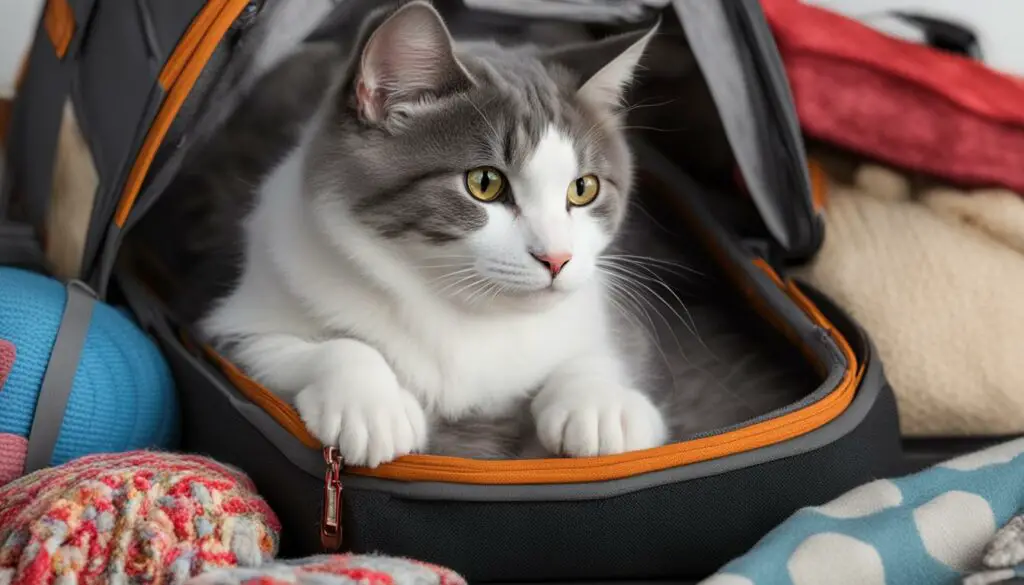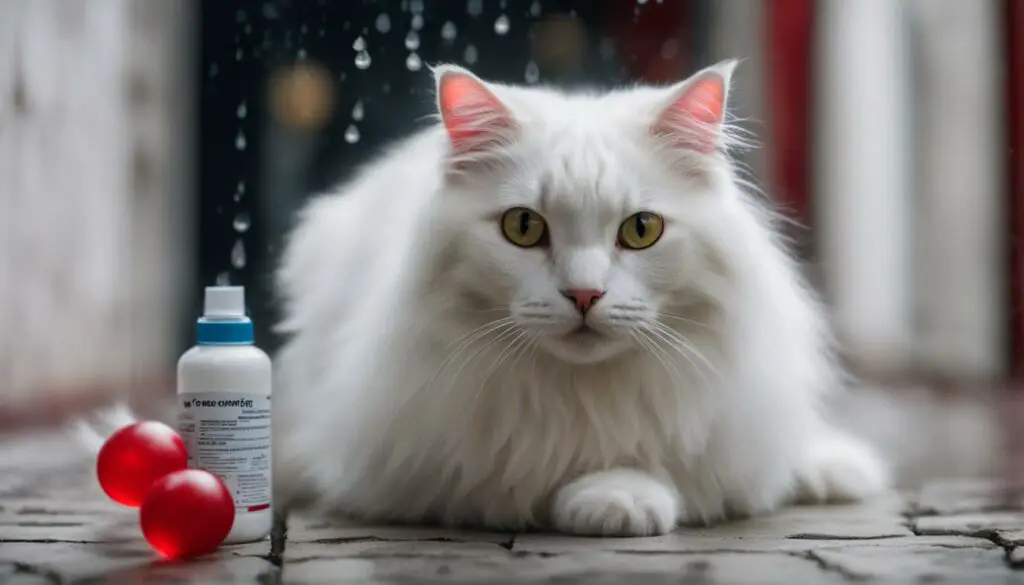Traveling with a cat can be a stressful experience for both the owner and the feline. Many cat owners wonder if they can give their cats Benadryl to help them cope with the anxiety and discomfort of travel. In this article, I will provide you with a comprehensive guide on whether Benadryl is safe for cats, its recommended dosage, and alternative options to consider. Let’s dive in!
Key Takeaways:
- Benadryl can be used off-label for cats under the guidance of a veterinarian.
- Diphenhydramine, the active ingredient in Benadryl, is generally considered safe for healthy cats.
- Consult with a veterinarian before giving Benadryl to a cat, especially if they have underlying medical conditions.
- Vets may recommend Benadryl for allergic reactions, motion sickness, and minor sedation in cats.
- Benadryl can have side effects in cats, such as sedation, vomiting, and diarrhea.
Is Benadryl Safe for Cats?
Diphenhydramine, the active ingredient in Benadryl, is generally considered safe for healthy young cats. However, it should not be given to cats with certain conditions, such as glaucoma, heart disease, high blood pressure, or chronic medical conditions. It is important to consult with a veterinarian before giving Benadryl to a cat, as they can provide guidance on its safety and appropriate dosage.
While Benadryl may be safe for some cats, it is important to understand that every cat is unique and may react differently to medications. Some cats may experience adverse side effects, such as sedation, excitement, or gastrointestinal upset. It is crucial to monitor your cat closely after giving them Benadryl and contact your veterinarian if you notice any concerning symptoms.
When using Benadryl for cats, it is important to use the correct dosage and administration method recommended by your veterinarian. They will consider factors such as your cat’s weight, age, and overall health to determine the appropriate dose. It is crucial to follow their instructions carefully and avoid giving your cat more than the recommended amount.

The table below provides a general guideline for Benadryl dosage in cats:
| Weight of Cat | Benadryl Dosage |
|---|---|
| 5lbs (2.3kg) | 5-10mg (total daily dose) |
| 10lbs (4.5kg) | 10-20mg (total daily dose) |
| 15lbs (6.8kg) | 15-30mg (total daily dose) |
Please note that this is a general guideline and your veterinarian may recommend a different dosage based on your cat’s specific needs. Always consult with your veterinarian for accurate dosing instructions.
Why Do Vets Recommend Benadryl for Cats?
Veterinarians may recommend Benadryl for cats in certain situations to provide relief from various conditions. While it is not a cure-all, Benadryl can offer some benefits when used correctly.
Allergic Reactions: One of the main reasons vets recommend Benadryl for cats is to treat allergic reactions. This can include acute reactions to insect stings or chronic allergies. Benadryl can help reduce itching, swelling, and other discomfort associated with allergies.
Motion Sickness and Sedation: Benadryl can also be used to help cats with motion sickness during travel. It can help reduce nausea and calm the cat during the journey. Additionally, Benadryl may provide minor sedation, which can be useful for veterinary procedures or situations that require the cat to stay calm.
“Vets may recommend Benadryl for cats to treat acute allergic reactions, such as insect stings, or chronic allergies. It can also be used to help reduce the severity of motion sickness and provide minor sedation.”
However, it is important to note that not all cats will respond well to Benadryl, and its effectiveness can vary depending on the individual cat and the specific condition being treated. There may be other medications or treatments that are more appropriate and effective for certain allergies or situations. Consulting with a veterinarian is crucial to ensure the best course of action for your cat’s well-being.
Benefits of Benadryl for Cats
When used correctly and under veterinary guidance, Benadryl can offer several benefits for cats. These include:
- Relief from allergic reactions, such as itching and swelling
- Reduction in motion sickness symptoms during travel
- Minor sedation for veterinary procedures or stressful situations
It is important to keep in mind that Benadryl should only be used as directed by a veterinarian, and the dosage should be carefully measured based on the cat’s weight and individual needs. Monitoring for any potential side effects is also essential to ensure the cat’s safety and well-being.
| Benefits of Benadryl for Cats | Usage | Dosage |
|---|---|---|
| Allergic Reactions | Acute and chronic allergies | Consult a veterinarian for precise dosage instructions |
| Motion Sickness | During travel | Based on the cat’s weight, consult a veterinarian for precise dosage instructions |
| Sedation | Veterinary procedures or stressful situations | Based on the cat’s weight, consult a veterinarian for precise dosage instructions |
Remember, Benadryl should not be used as a substitute for proper veterinary care. If your cat is experiencing allergies, motion sickness, or other issues, it is important to consult with a veterinarian to determine the best course of action and provide the appropriate treatment.
Possible Side Effects of Benadryl in Cats
While Benadryl can be a helpful medication for cats in certain situations, it is important to be aware of the potential side effects that it can cause. Cats may react differently to Benadryl, and some may experience side effects while others may not. It is crucial to use Benadryl on a short-term basis and follow the veterinarian’s recommendations closely to minimize the risk of side effects.
| Side Effects of Benadryl in Cats | Common | Less Common |
|---|---|---|
| Sedation | ✔ | |
| Excitement | ✔ | |
| Lethargy | ✔ | |
| Vomiting | ✔ | |
| Diarrhea | ✔ | |
| Dry mouth | ✔ | |
| Lack of appetite | ✔ | |
| Urinary retention | ✔ |
The most common side effect of Benadryl in cats is sedation. Cats may become drowsy or sleep more than usual after taking Benadryl. On the other hand, some cats may experience excitement or hyperactivity, which is a less common side effect. Lethargy, vomiting, diarrhea, dry mouth, lack of appetite, and urinary retention are also possible side effects that may occur in some cats. It is important to monitor your cat closely after giving them Benadryl and contact your veterinarian if you notice any concerning side effects.
It is worth noting that these side effects can vary in severity and frequency between cats. Some cats may have a higher sensitivity to Benadryl or may be more prone to experiencing certain side effects. Additionally, the dosage and duration of Benadryl use can also impact the likelihood of side effects occurring. It is crucial to strictly follow the recommended dosage guidelines provided by your veterinarian and always consult them before giving any medication to your cat.
Dosage for Benadryl in Cats
When it comes to giving Benadryl to cats, determining the correct dosage is crucial for their safety and effectiveness. The dosage of Benadryl for cats is typically based on their weight and can range from 1-4 mg per kilogram of body weight. However, it is important to consult with a veterinarian before administering any medication to your cat, including Benadryl, as they can provide specific guidance based on your cat’s individual needs and health condition.
The form in which Benadryl is administered can also vary, with oral and injectable options available. Your veterinarian will determine the most appropriate form and dosage for your cat’s specific situation. It is important to note that using the correct formulation of Benadryl and following the recommended dosage is crucial to avoid over- or under-dosing, as both can have adverse effects on your cat’s health.
Here is a table summarizing the typical dosage range for Benadryl in cats based on weight:
| Weight Range | Benadryl Dosage |
|---|---|
| 2-4 lbs | 2-4 mg |
| 4-8 lbs | 4-8 mg |
| 8-12 lbs | 8-12 mg |
| 12 lbs and over | 12-16 mg |

Remember, the dosage provided in the table is a general guideline and should not be used without consulting your veterinarian. They will consider your cat’s health condition, age, and other factors to determine the most appropriate dosage. Using the correct dosage of Benadryl will help ensure the safety and effectiveness of the medication in managing your cat’s allergies or travel-related concerns.
Alternatives to Benadryl for Cat Allergies
While Benadryl is sometimes used to treat chronic environmental allergies in cats, it may not be the most effective treatment for all cats. Other medications and natural remedies can also be considered to help alleviate cat allergies. Here are some alternatives to Benadryl:
1. Antihistamines:
Just like humans, cats can benefit from antihistamines to reduce allergy symptoms. However, it’s crucial to consult with a veterinarian before administering any antihistamines to ensure the correct dosage and safety for your cat. Some commonly used antihistamines for cats include cetirizine and chlorpheniramine.
2. Allergy Injections:
Allergy injections, also known as immunotherapy, can be a long-term solution for managing cat allergies. This treatment involves gradually exposing the cat to small amounts of the allergen to build up tolerance over time. It is typically recommended for severe or recurring allergies and is administered by a veterinarian.
3. Omega-3 Fatty Acids:
Omega-3 fatty acids have anti-inflammatory properties and can help reduce allergic reactions in cats. They can be found in fish oil supplements specifically formulated for pets. Adding these supplements to your cat’s diet may help alleviate allergy symptoms.
| Alternative | Description |
|---|---|
| Antihistamines | Medications that can reduce allergy symptoms in cats. |
| Allergy Injections | Long-term treatment to build tolerance to allergens. |
| Omega-3 Fatty Acids | Supplements with anti-inflammatory properties. |
Alternative treatments, such as antihistamines, allergy injections, and omega-3 fatty acids, can provide relief for cats with allergies. It’s important to consult with a veterinarian to determine the most suitable option for your cat’s specific needs and allergies.
While Benadryl may be a commonly used option, it’s essential to explore other alternatives and work closely with a veterinarian to develop a tailored treatment plan that will effectively manage your cat’s allergies. Each cat is unique, and what works for one may not work for another. Consider natural remedies and other medications under veterinary guidance to ensure the best possible outcome for your feline companion.

Tips for Traveling with a Cat
Traveling with a cat can be a daunting task, as cats can experience anxiety and discomfort during journeys. However, with proper planning and preparation, you can help make the travel experience smoother and less stressful for both you and your feline companion. Here are some tips to consider:
- Use a secure carrier: Invest in a sturdy and well-ventilated carrier that provides a safe and comfortable space for your cat. Make sure the carrier is the appropriate size for your cat, allowing them to stand, turn around, and lie down comfortably.
- Get your cat used to the carrier: Gradually introduce your cat to the carrier before the actual travel date. Leave the carrier open in a familiar and calm environment, and encourage your cat to explore it by placing treats and toys inside. This will help your cat associate the carrier with positive experiences.
- Consider calming products or natural remedies: There are various products available, such as pheromone sprays or herbal supplements, that can help reduce anxiety in cats. Consult with your veterinarian to determine which options may be suitable for your cat and the specific travel situation.
- Provide a familiar blanket or toy: Packing a blanket or toy that carries the scent of home can provide a sense of comfort and familiarity for your cat during the journey. This can help alleviate anxiety and reduce stress.
By following these tips, you can help minimize your cat’s anxiety and ensure a more pleasant travel experience for both of you. Remember to always prioritize your cat’s safety and well-being, and consult with your veterinarian for personalized advice based on your cat’s specific needs and travel requirements.

Table: Essential Items for Traveling with a Cat
| Item | Description |
|---|---|
| Secure carrier | A sturdy, well-ventilated carrier that provides a safe and comfortable space for your cat during travel. |
| Comforting bedding | A familiar blanket or bedding that carries the scent of home, providing comfort and familiarity for your cat. |
| Calming products | Products such as pheromone sprays or herbal supplements that can help reduce anxiety in cats during travel. |
| Food and water | Pack enough food and water for your cat’s journey, considering any dietary restrictions or preferences. |
| Litter and litter box | Carry a portable litter box and enough litter to ensure your cat’s comfort and hygiene needs are met. |
| Identification tags | Ensure your cat wears a collar with identification tags that include your contact information. |
| Veterinary records | Carry copies of your cat’s veterinary records, including vaccination records and any necessary medications. |
| Medical supplies | If your cat requires any medications or special medical supplies, pack them in a secure and easily accessible container. |
Motion Sickness and Calming Products for Cats During Travel
Traveling with cats can be a wonderful experience, but for some felines, it can also be a source of anxiety and motion sickness. Just like humans, cats can experience queasiness and discomfort when on the move. Fortunately, there are several options available to help alleviate these issues and make travel more pleasant for your furry friend.
Motion Sickness in Cats During Travel
Motion sickness in cats can manifest in various ways, including vomiting, drooling, restlessness, or even hiding. If your cat exhibits these symptoms during travel, it’s essential to address the issue to ensure their comfort and well-being.
Calming Products for Cats During Travel
In addition to addressing motion sickness, calming products can help reduce anxiety and stress in cats during travel. These products are designed to provide a sense of security and relaxation, making the journey more comfortable for your furry friend. Some of the popular calming products for cats during travel include:
| Product | Description |
|---|---|
| Calming Sprays | These sprays contain soothing pheromones that mimic the natural calming scents produced by cats. Simply spray them on your cat’s carrier or bedding before travel to help create a sense of familiarity and reduce anxiety. |
| Calming Collars | Calming collars are infused with pheromones that provide a continuous sense of security and comfort for your cat. They can be worn during travel to help alleviate stress and anxiety. |
| Calming Treats | Calming treats are specially formulated with ingredients such as chamomile, L-theanine, or valerian root, known for their relaxing properties. These treats can be given to your cat before or during travel to promote a sense of calmness. |
It’s important to note that not all cats may respond the same way to calming products, and it may require some trial and error to find the most effective option for your cat. Consulting with a veterinarian can provide valuable guidance and recommendations based on your cat’s specific needs and preferences.

By addressing both motion sickness and anxiety through the use of calming products, you can help make travel a more enjoyable experience for your cat. Remember, each cat is unique, and what works for one may not work for another. Patience, attentive observation, and consulting with a veterinarian will help you find the most suitable approach to ensure your cat’s well-being during travel.
Sedation Options for Cats During Travel
When it comes to traveling with cats, some feline friends may experience anxiety or stress. In certain cases, a veterinarian may recommend using sedation to help keep them calm and relaxed during the journey. Sedatives such as buprenorphine or alprazolam can be prescribed to help alleviate travel-related anxiety in cats.
It is important to note that sedation should only be used under the guidance of a veterinarian and should not be relied upon as a long-term solution. The dosage and administration of sedatives will vary based on the cat’s weight, health condition, and specific needs. Consulting with a veterinary professional will ensure the proper use and safety of sedation for your cat during travel.
While sedation can be beneficial for some cats, it may not be suitable for every feline traveler. It is essential to consider your cat’s individual needs and preferences, as well as any potential risks or side effects associated with sedation. Discussing alternative options with your veterinarian, such as natural remedies or behavioral techniques, may also be beneficial in managing your cat’s anxiety during travel.
| Sedative | Dosage | Administration |
|---|---|---|
| Buprenorphine | Varies based on cat’s weight and condition | Oral Subcutaneous injection |
| Alprazolam | Varies based on cat’s weight and condition | Oral |
Using sedation for cats during travel can help reduce anxiety and promote a more relaxed journey. However, it is crucial to consult with a veterinarian to determine the most appropriate sedative, dosage, and administration method for your cat. Safety and well-being should always be the top priority when considering sedation for your feline companion.
Alternative Options for Managing Cat Anxiety During Travel
While sedation can be effective for some cats, there are alternative options available to help manage cat anxiety during travel. Natural remedies, such as pheromone sprays or herbal supplements, can help promote a sense of calm and relaxation. Additionally, behavioral techniques, such as desensitization and counterconditioning, can help cats become more comfortable with travel over time.
It is essential to remember that each cat is unique, and what works for one may not work for another. A comprehensive approach that considers your cat’s specific needs, preferences, and health condition will help ensure a more pleasant and stress-free travel experience for both you and your feline companion.
Preparing Cats for Travel
When it comes to traveling with a cat, proper preparation is key to ensuring a smooth and stress-free experience for both you and your feline friend. Here are some essential tips to help you prepare your cat for travel:
1. Familiarize Your Cat with the Carrier
Introduce your cat to the carrier well in advance of the travel date. Leave the carrier open in a familiar and accessible area of your home, and encourage your cat to explore it at their own pace. You can place treats or their favorite toys inside the carrier to create a positive association.
2. Practice Short Trips
Before embarking on a long journey, take your cat on a few short trips in the car to help them get used to the sensation of traveling. Start with brief drives around the block and gradually increase the duration. This will help acclimate your cat to the movement and sounds of the vehicle.
3. Create a Comfortable and Secure Space
During the journey, ensure that your cat has a comfortable and secure space in the carrier. Line the carrier with a familiar blanket or towel, and place a toy or an item with your scent to provide a sense of comfort and familiarity. Make sure the carrier is well-ventilated and securely latched to prevent any escapes.
4. Provide Essential Needs
Remember to pack necessary supplies such as food, water, and a litter box for your cat. It’s important to maintain their regular feeding and bathroom schedules, so try to plan stops along the way to accommodate their needs. Additionally, carry any medications or special items your cat requires, ensuring they are easily accessible.

By following these tips, you can help alleviate stress and ensure a more comfortable travel experience for your cat. Remember to consult with your veterinarian for any specific recommendations or concerns, as they can provide tailored advice based on your cat’s individual needs.
Is Benadryl the Best Medication for Cat Allergies?
When it comes to treating cat allergies, Benadryl is a commonly used medication. However, it may not always be the most effective or suitable option for every cat. While Benadryl is an antihistamine that can help alleviate allergy symptoms in some cats, there are other antihistamines available that may be more effective in managing cat allergies.
It is important to work with a veterinarian to determine the best course of treatment for your cat’s specific allergies. They can assess the severity of the allergies, identify the specific allergens causing the reaction, and recommend the most appropriate medication to address your cat’s symptoms.
Other antihistamines commonly prescribed for cat allergies include cetirizine, loratadine, and fexofenadine. These medications have been found to be effective in reducing allergic reactions in cats and may be better suited for certain individuals. It is important to follow your veterinarian’s guidance on dosage and administration to ensure the safe and effective use of any medication.
Comparison of Antihistamines for Cat Allergies
| Antihistamine | Effectiveness | Safety | Dosage |
|---|---|---|---|
| Benadryl (diphenhydramine) | May be effective in some cats | Generally safe when used as directed | 1-2 mg per pound of body weight, 2-3 times daily |
| Cetirizine (Zyrtec) | Effective in reducing allergic reactions | Generally safe for cats | 5 mg (half a tablet) once daily |
| Loratadine (Claritin) | Effective in reducing allergic reactions | Generally safe for cats | 5 mg (half a tablet) once daily |
| Fexofenadine (Allegra) | Effective in reducing allergic reactions | Generally safe for cats | 5 mg (half a tablet) once daily |
Each cat may respond differently to different medications, so it is important to monitor your cat’s response to any prescribed antihistamine and consult with your veterinarian if there are any concerns or changes in your cat’s condition. Your vet will be able to make adjustments to the treatment plan as needed to ensure the best outcomes for your cat’s allergies.

Conclusion
Traveling with a cat can be both exciting and challenging, especially when it comes to managing anxiety and allergies. As a cat owner, you may wonder if you can give your cat Benadryl for travel. While Benadryl can be used under the guidance of a veterinarian, it is important to consider other options and consult with a professional to ensure the safety and well-being of your feline friend.
When it comes to cat anxiety during travel, natural remedies can be a helpful alternative to medication. Calming products specifically designed for cats, such as pheromone sprays or herbal supplements, can help reduce stress and promote relaxation. Additionally, creating a comfortable and secure environment in your cat’s carrier, with familiar blankets or toys, can also help ease anxiety.
If your cat experiences motion sickness during travel, there are various options available to alleviate the symptoms. Anti-nausea medications or even specialized cat-friendly motion sickness products can help reduce discomfort and improve the travel experience for your cat. However, it is important to consult with a veterinarian to determine the most suitable option for your cat’s specific needs.
Proper preparation is key to ensuring a smooth and stress-free travel experience for your cat. This includes familiarizing them with their carrier well in advance, practicing short trips before the actual travel, and providing a comfortable and secure space during the journey. Additionally, ensuring access to necessary food, water, and a clean litter box is essential to keep your cat comfortable throughout the trip.
FAQ
Can I give my cat Benadryl for travel?
Benadryl can be given to cats for travel, but it should only be done under the guidance of a veterinarian and with specific dosing advice. It should not be used as a substitute for proper veterinary care.
Is Benadryl safe for cats?
Benadryl is generally considered safe for healthy young cats, but it should not be given to cats with certain conditions. It is important to consult with a veterinarian before giving Benadryl to a cat to ensure its safety and appropriate dosage.
Why do vets recommend Benadryl for cats?
Vets may recommend Benadryl for cats to treat acute allergic reactions, chronic allergies, motion sickness, and to provide minor sedation. However, it may not be the most effective treatment for all cats, and other medications may be more appropriate for certain conditions.
What are the possible side effects of Benadryl in cats?
Benadryl can have side effects in cats, including sedation, excitement, lethargy, vomiting, diarrhea, dry mouth, lack of appetite, and urinary retention. It is important to use Benadryl on a short-term basis and follow the veterinarian’s recommendations to minimize the risk of side effects.
What is the dosage for Benadryl in cats?
The dosage of Benadryl for cats is typically based on their weight and can range from 1-4 mg per kilogram of body weight. The form and dosage should be determined in consultation with a veterinarian to ensure proper administration.
What are the alternatives to Benadryl for cat allergies?
While Benadryl can be used to treat some cat allergies, it may not be the most effective or appropriate medication for all cats. Other antihistamines, allergy injections, or natural remedies may be more suitable depending on the specific allergies and the cat’s individual response.
What are some tips for traveling with a cat?
Some tips for traveling with a cat include using a secure carrier, getting the cat used to the carrier before travel, using calming products or natural remedies, and providing a familiar blanket or toy for comfort. It is important to plan ahead and consider the specific needs and preferences of your cat.
What are some motion sickness and calming products for cats during travel?
There are various motion sickness medications and calming products available for cats, such as anti-nausea medications or pheromone sprays. These can help reduce anxiety and alleviate motion sickness symptoms. It is important to consult with a veterinarian to determine the most suitable option for your cat.
What sedation options are available for cats during travel?
In certain cases, a veterinarian may recommend sedation for cats during travel to help keep them calm and reduce anxiety. Sedatives such as buprenorphine or alprazolam may be prescribed to help the cat relax during the journey. However, sedation should only be used under the guidance of a veterinarian and should not be relied upon as a long-term solution.
How do I prepare my cat for travel?
Proper preparation is key to ensuring a smooth and stress-free travel experience for cats. This includes familiarizing them with their carrier, practicing short trips before the actual travel, ensuring they have a comfortable and secure space during the journey, and providing necessary food, water, and litter box access.
Is Benadryl the best medication for cat allergies?
Benadryl can be used to treat some cat allergies, but it may not be the most effective or appropriate medication for all cats. Other antihistamines or allergy medications may be more suitable depending on the specific allergies and the cat’s individual response. It is important to work with a veterinarian to develop an effective treatment plan for cat allergies.
Source Links
- https://petmd.com/cat/general-health/can-you-give-cat-benadryl
- https://www.thesprucepets.com/can-you-give-cats-benadryl-3384905
- https://lovethemaldives.com/faq/can-i-give-my-cat-benadryl-for-travel








